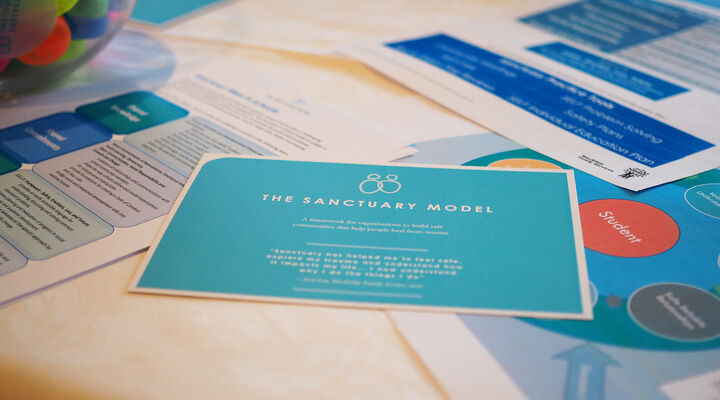About to celebrate its second year in Maidstone, MacKillop Family Services Primary School is successfully working with local children who are disengaged from education and who struggle to experience success in a mainstream setting.
The new Primary Campus was opened in Gilda Street, Maidstone in 2017, in recognition of the importance of early intervention to enhance educational outcomes. It sits alongside MacKillop Family Services’ School Campus in Geelong which caters for both primary and secondary students.
Principal, Anne Henderson, recognises that,
“While all schools are committed to inclusion and are passionate about catering for the individual needs of their students, it is not always possible for mainstream settings to support students with diverse and complex needs.”
The MacKillop school offers a unique teaching and learning environment that ensures every child is offered an individualised program that is mindful of both their strengths and their barriers to learning. The school implements the Victorian Curriculum and is informed by best practice in teaching and learning, enabling it to provide a stimulating and engaging environment, where extensive adjustments can be made for individual students, as required.
Ms Henderson adds that the schoolwide implementation of the Sanctuary Model, a trauma-informed model of practice, means it is uniquely placed to support young children who have experienced trauma or adversity, which often is the cause of behavioural challenges,
“The Sanctuary Model equips everyone at the school not to focus on what a child has done wrong, but rather to take the approach ‘what has happened to this child?’
“Too often, challenging behaviours and a refusal to engage in learning can be interpreted as defiant and we move to punitive responses that further compounds a child’s sense of shame and the child’s reluctance to engage in learning. All behaviour is communicating a need; if, as educators, we listen attentively, with an open heart and mind, we can interpret this language and build a bridge for the student to cross, a bridge from disengagement to learning. This understanding informs the way we work and organise our programs and daily practice.”
This approach has allowed *Michael, a nine-year-old who was refusing to go to school, to re-engage with education. At his mainstream school, Michael was doing everything he could to escape from the classroom by pushing over the tables and chairs and running away. One day, Michael climbed to the highest point of the playground and refused to come down.
Michael’s mother was desperate. Medication hadn’t helped, he begged her not to send him to school, the teachers there couldn’t make a connection with him. He was being bullied and had no friends. Michael was rapidly approaching exclusion from school, where staff were finding it increasingly difficult to cope with his behaviour.
Michael’s mum heard about MacKillop’s Primary Campus at Maidstone and he joined the school last year. Almost immediately, Michael responded to the atmosphere at MacKillop Maidstone and with help from his teachers and key workers he learned to use the Sanctuary Model to develop his own safe space.
Principal, Anne Henderson, explains the personalised and collaborative model of the school:
“There are no more than 8 students in a class and while consideration is given to the age of the students, there is a focus on the individual needs of each child and how they might interact with others in a class group. A Key Teacher and Education Support is allocated to each class and they are also supported by the Head of Campus, who provides supervision and instructional coaching. the Education and Wellbeing Coordinator and the Educational Psychologist.
The key to the school’s success is working closely with families and other professionals to support the child. This multi-disciplinary approach means that our knowledge and understanding of the child are enriched and our combined expertise enhances the student’s academic and social-emotional outcomes.”
For Michael, tailored approaches to learning have resulted in greater engagement in the classroom. Michael is sensitive to sound so he wears noise-cancelling headphones and he can eat outside of official breaks to help maintain his energy levels; this, in turn, helps to regulate adrenaline surges.
Michael’s mum noticed a huge change in him during his time at MacKillop; Michael is much calmer and is happily making friends. The Head of Campus, his Key Teacher, says Michael has developed an incredible sense of self-awareness and emotional intelligence and he was able to increasingly manage his feelings of anger or anxiety.
Michael was with MacKillop for almost a year and loved expressing his feelings through art. When asked which self-management tools worked best for him, he responded, “I'd probably say learning how to breathe at the right pace to be able to stay calm.”
Michael wants to be a paleontologist when he grows up and in his own words, “I probably would have gotten expelled if I hadn’t come to MacKillop.”
After a year at MacKillop’s Maidstone school, Michael has now transitioned back to his mainstream school. His Key Teacher said, “If Michael had continued on the path he was taking before he came to us, he could well have gone into the juvenile justice system... Instead, now we've got a kid who, honestly, if he keeps going the way he is ... he can do whatever he wants.”
*Name changed for privacy reasons




